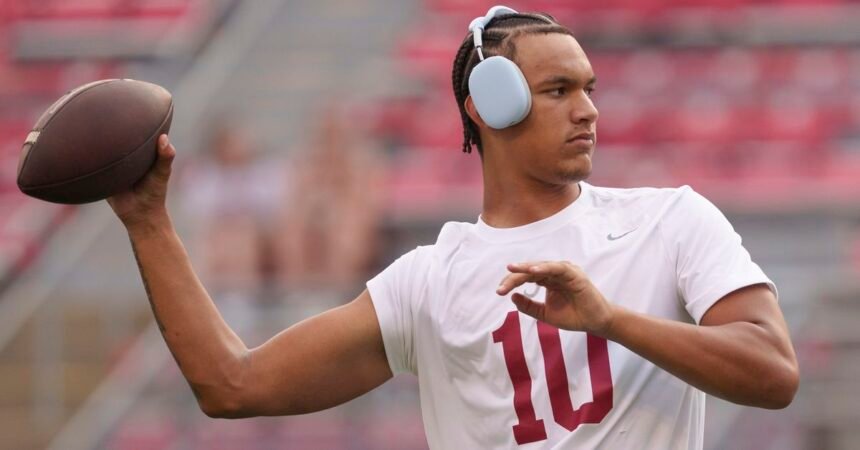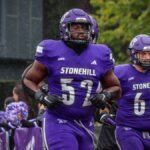Happy Friday, everyone. Ryan Grubb was talking quarterbacks recently, and clearly sees big potential in Austin Mack.
“When he’s on, and he’s pushing the ball where it’s supposed to go, I told him — and I mean it — if you went out to an NFL game and you watch some guys throw before the game, you’re like, that’s what they look like,” Grubb told Tide 100.9 radio on Thursday. “And that’s how Austin is. We’ve got to get the other part all rectified, as far as decision-making and things like that. He’s an incredibly talented kid.”
Grubb said Mack can still “run and move around” despite his size, and added that Mack is “probably your best pure thrower” in the quarterback room.
Just power and tempo of the football, where he can put it, touch,” Grubb explained. “He is a pure thrower of the ball. He’s just like Keelon still developing as a decision-maker and still getting command of the offense. But certainly the reps he’s been able to get this spring, even this summer already is really what he didn’t have his first two years because he just wasn’t in a position to be even a backup or in a competitive role for the starting position.
“So now all the coaching and reps he’s getting, I feel like he’s growing every week. But I think he’s more mobile than people think. He’s extremely intelligent, and for Austin, he probably picks stuff up as fast if not faster than anybody in the room. Very, very smart kid. Now it’s just letting the game slow down for him, letting him make the easy plays look easy.”
Ty Simpson remains the leader in the clubhouse, and Keelon Russell has received a ton of hype as the highest rated recruit in Alabama history. But Mack is huge, and has shown glimpses of elite arm talent.
PFF ranks Cam Calhoun as one of their 10 impact transfers across the country.
CB Cam Calhoun, Alabama
Calhoun joins the Crimson Tide after playing for Utah last year. He earned an impressive 82.8 PFF grade as a redshirt freshman, placing 10th among Power Four cornerbacks. Calhoun allowed just 48.8% of his targets to be caught while finishing as one of the 30 most valuable corners in the nation despite only playing the fourth-most snaps among the Utes’ corners.
He needs to add weight as he’s just 6-feet, 177 pounds, but he has excellent make-up speed and should be a major reason why Alabama has one of the best defenses in college football next season.
Meanwhile another DB, Dijon Lee, joins OL Michael Carroll as freshmen to watch this fall per CBS.
Yep, two five-stars for the Tide. Carroll was thought to be the best interior o-line prospect in the 2025 class, but he spent most of the spring playing offensive tackle. It’ll be interesting to see if he stays there going into the fall. Either way, he’s a two-deep lock. You could say the same of Lee, who had a strong debut for the Tide and projects to be right behind Domani Jackson and Zabien Brown on the depth chart at cornerback. A few of Alabama’s freshman receivers flashed this spring, but the Tide are so deep at that spot it’d be a surprise for someone to pull a Williams.
ESPN’s Adam Rittenberg has Alabama 10th in his “future power rankings.”
Roster management: The Tide took more depth hits with portal losses but kept their mainstay players at most positions, including wide receiver Ryan Williams, Proctor, linebacker Deontae Lawson and defensive backs Domani Jackson, Zabien Brown and Keon Sabb. Alabama didn’t add a ton of transfers but addressed depth on both lines and on the perimeter with wide receiver Isaiah Horton (Miami) and tight end Brody Dalton (Troy). Coach Kalen DeBoer’s first full recruiting class ranked No. 4 nationally, including Russell, a five-star player, and 14 other ESPN 300 prospects. The 2026 class, though, is off to a slower start.
Star power: There’s a reason Williams is one of the cover players for EA Sports College Football 26. He should be in contention for national honors, along with Proctor, Lawson and potentially others. The 325-pound Keenan could be poised for a big year at defensive tackle, and Alabama’s retention in the secondary could produce more All-SEC-type players. Jam Miller should be Alabama’s featured running back after rushing for 668 yards last fall.
Coaching staff: DeBoer should have more of an imprint on the roster and program in Year 2, but must deliver a CFP appearance, at minimum. He reunited with offensive coordinator Ryan Grubb, his OC at Washington and Fresno State, and retained the rest of his on-field staff.
A trip to Tuscaloosa with a new OC and a transfer QB who was mid at his last stop is going to be tough sledding for Wisconsin.
After finishing in the bottom third of the country in total offense, Wisconsin made a change at offensive coordinator with the hiring of Jeff Grimes. He won’t have an easy job trying to fix a Badger offense that struggled in 2024.
Every quarterback from last season’s QB room at Wisconsin transferred out, including the season starter Tyler Van Dyke (who was injured early in the Alabama game) and his replacement Braedyn Locke. Maryland transfer Billy Edwards Jr. is expected to be the guy at quarterback this season for the Badgers.
A call is scheduled next week for the powers that be to discuss where the transfer portal window will land. January seems like the most likely option.
One player agent, granted anonymity to discuss his work with players, told The Athletic he prefers January and tells his clients to avoid the spring portal anyway unless they’re an elite athlete. The agent was concerned that a later portal could cause kids to check out and create a limbo period, or that it would open up even more opportunities for springtime tampering.
“Kids are going to know they’re leaving before they even talk with their coaches,” the agent said. “With January, kids are home for the holidays, talk it over with your circle, people you trust, and if you leave, you can find a school and enroll in time for class. If it’s spring-only, you may have kids fall into a mental ditch.”
Not everyone is on board with a January portal window. Multiple people involved in the process said some power conference schools prefer spring, especially those whose academic calendars run on a quarter system and start class earlier in January, before the portal closes.
The kid who moved from Wisconsin to Miami without ever entering the portal seemed to render this moot, but we’ll see what they decide.
This clip reads like a comedy show.
Just a few minutes into Thursday’s congressional hearing on college sports, a Democrat member accused her Republican colleagues of secretly drafting the legislation, intentionally cutting out members of her party and not properly giving public notification of the hearing.
Seconds later, another member put aside college sports talk to discuss how President Donald Trump, he says, is “trying to destroy American higher education.”
And a third sitting committee member, very flatly, described her feelings on legislation that would grant the NCAA and power conferences liability protection: “This is something I cannot support.”
If anyone thought the approval of the House settlement would result in a newfound focus and agreement among lawmakers over a federal college sports bill, think again.
Just our federal government, functioning like the well oiled machine we’ve come to know and love. Congress isn’t going to save us, folks.
Ross Dellenger wrote about the new clearinghouse that will likely be powerless.
While many doubt that the clearinghouse will withstand inevitable legal challenges, administrators here provided legitimate reasons for why they believe in its long-term survival. Most notable of those, says NCAA president Charlie Baker, is that the clearinghouse’s appeals process — arbitration — is equipped with subpoena powers.
“They do have that power,” Baker told Yahoo Sports this week. “Arbitration typically has subpoena power and I’m pretty sure since this one sits inside an injunction, they will have it.”
Officials at the power conferences confirmed that “significant subpoena powers” exist under the arbitration appeals process, but those powers are less expansive than subpoena authority within a courtroom. The decision to use subpoena powers and how exactly to use them — limited or broad — is expected to rest with the arbitrator presiding over the appeals process.
Alabama has partnered with a fintech firm to help educate staffers and athletes around all things NIL.
Discussions between the athletics department and Scout focused on cyber security, compliance and Alabama’s unique needs. The relationship will begin with training for athletics department staff and Crimson Tide athletes gaining access to the proprietary Scout platform. Scout leadership will also provide financial literacy training sessions centered around the new age of revenue sharing and the next generation of NIL.
“Alabama’s legacy speaks for itself,” said Michael Haddix, CEO and Founder of Scout. “We’re proud they chose Scout to address the unique challenges and opportunities of today’s NIL landscape. Our customizable, end-to-end platform empowers players to take control of their financial futures while providing security and efficiency at the department level.” Haddix continued, “We look at NIL differently at Scout — for us, it means Name, Image … Lifetime.”
Last, Tennessee nonsense. I’m sure you’ll be shocked to learn that they had a scam artist on staff….
Frerking’s employment with UT raises eyebrows after a Knox News investigation revealed he had been involved in numerous financial scams related to Metro Straw, his former ground cover business in Atlanta.
Customers accused him of pretending to work for Metro Straw to collect money from customers who sent payments believing he still worked there, only to be left without product delivered.
Frerking was also evicted from two Nashville apartments this year, according to court records, and owed $16,387 in unpaid rent in the upscale neighborhood The Gulch.
… and Zakai Zeigler is going to have to get a job.
“Plaintiff has failed to present sufficient evidence that the Four-Seasons Rule produces substantial anticompetitive effects in the market for student-athlete services and NIL compensation in Division I basketball,” wrote U.S. District Court Judge Katherine Crytzer in her June 12 ruling. The ruling followed a hearing June 6.
“What the NCAA should do as a policy matter to benefit student athletes is beyond the reach of the Sherman Act and TTPA and by extension, this Court,” she wrote.
Feels like the first time in a while that a judge has found the intestinal fortitude to tell a player, “no.” For now, the five year eligibility window remains intact.
That’s about it for today. Have a great weekend.
Roll Tide.










